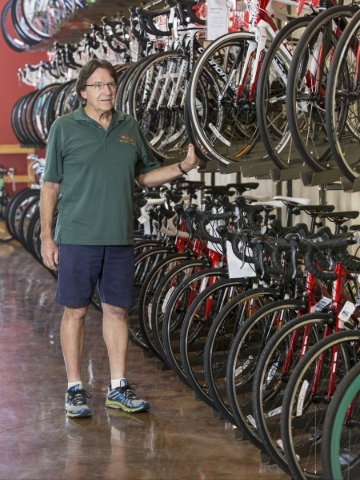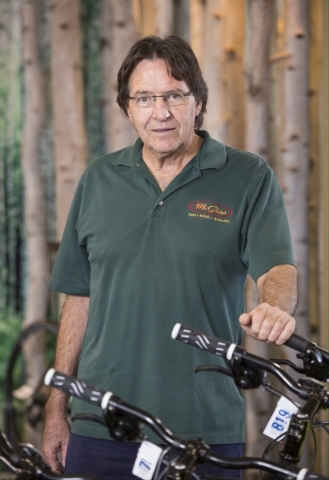Bicycle store owners survive, thrive amid Web competition
Southwest Bikes co-owner Ted Jewell tells the story of a man who bought a bicycle from Wal-Mart that was still in the box, then called the Southwest Bikes retail shop and wanted a mechanic to assemble it for $20.
Jewell told the man the standard store fee to put a bicycle together is $85. When the customer complained the fee was more than what he bought the bike for, Jewell was unsympathetic.
"I said thank you very much," Jewell recalled, and ended the conversation.
Welcome to the challenges of being a retail bicycle shop owner. Behind the romance of owning a bike shop is the challenge of massaging a profit on thin margins in a brick-and-mortar store.
Thorny issues range from competing with Internet sellers to coping with sales tax discrimination to dealing with transportation infrastructure that is built primarily for cars and not the products you sell.
"For the people who have to make a living (from a bike shop), it's hard work," Jewell said.
Surviving everything from bicycle manufacturers that are bypassing the bike shop middleman to sell bicycles directly to consumers to online accessory dealers like the Bike Nashbars of the world will be addressed during seminars at the Interbike trade show in Las Vegas from Sept. 16-18.
"I don't think any brick-and-mortar store has completely adapted to the Internet because everything is changing so quickly," said Fred Clements, executive director of the National Bicycle Dealers Association, the Costa Mesa, Calif.-based organization that represents bicycle shop owners.
"Long-term survivors will be savvy businesspeople able to control costs, they'll have excellent service departments, and they will be inspirational leaders of the local cycling community," said Clements, who leaves his executive director job Sept. 1.
Revenue passes a milestone
The bicycle industry, as a whole, has been holding steady for the past dozen years. In 2014, direct sales through all channels hit $6.1 billion, up from $5.8 billion in 2013, according to a report prepared by the Gluskin Townley Group for the bicycle dealers group.
But the number of retail bicycle shops in the U.S. has dropped from 6,259 in 2001 to 3,790 in 2015, according to an NBDA industry overview.
The good news is that the average annual shop revenue just passed the $1 million mark for the first time. A decade ago it was two-thirds of that number.
"So what seems to be happening is that the successful, efficient shops, that have figured out how to run a solid business, are succeeding. And their less efficient, experienced competitors are going away," said Ray Keener, executive director of the Bicycle Product Suppliers Association and a Boulder, Colo-based bike industry veteran who advises bike stores.
The bike shops sold about 3 million bicycles in 2014, a healthy number in historical terms. But the drop in the number of brick-and-mortar stores is troubling, the NBDA report said.
"Without healthy and vibrant local sources for bike products, service and repair, growth in cycling participation will be difficult to achieve," the report said.
A challenge is that consumers are shopping via the Internet for everything from bicycles and bike accessories to clothing and bike racks for cars.
"There are times when customers can buy things cheaper on the Internet than what we can from our vendors and that makes it difficult," said Mike Tillman, owner of Pro Cyclery in Las Vegas.
But what has Randy McGhie, owner of McGhie's bike shops in Las Vegas and Henderson, also upset is that consumers buying bicycles and parts online are not paying sales tax. That gives the Internet seller an unfair competitive edge over a local retail shop, Mcghie said. The sales tax in Clark County is 8.1 percent.
Trek, a well-known bicycle brand, is beefing up its Internet presence by selling its bicycles directly to consumers, and having its local dealers assemble the bike and receive a commission on the sale. Trek's move that drawn a lot of attention in the bicycle industry.
There's also talk of a Germany-based bicycle company, Canyon Bicycles, coming to North American markets and selling high-end bikes directly to consumers without the middleman bike shop.
"The biggest Internet threat is bike shops ignoring or denying the simple fact that the American consumer has totally embraced the Internet as a source of information and key component in the path to purchase … and literally expects brick-n-mortar and online bike shops to be the same retail entity that is available when the consumer wants to find out something or shop," said Jay Townley, partner of The Gluskin Townley Group, which worked on a report for the NBDA.
Keener outlined four go-with-the-flow ways for retail bike shops to cope with the Internet threat: Set up your own web selling system; make money on advising customers who want to buy online; appeal to new customers who need your help such as beginners, families or women; and adding services such as tours or coffee/beer bars.
Emphasizing customer service
To combat the Internet drawing revenues out of their coffers, bike shop owners are stressing customer service and timely repairs more than ever. Repairs can account for 15 percent to 20 percent of a shop's net income, Mcghie said.
Making the personal, face-to-face connection with a customer is something the online seller cannot do, the local bike shop owners said.
"That's one thing the internet can't take away," Pro Cyclery's Tillman said.
Tillman said when someone who bought a bike on the internet and brings it to his shop to assemble, his workers use the opportunity to connect with the customer so that the store can make money on repairs or accessory sales down the road.
Jared Fisher, owner of Las Vegas Cyclery in Summerlin, said while he dislikes consumers buying bicycles online, eventually they make their way to his store because they need repairs.
"In the end, bikes are mechanical and they will eventually need work on them. Brick and mortar is the only way," Fisher said. McGhie agreed that repairs are not only a crucial revenue-maker but an opportunity to build a relationship with a new customer. He also discounted mobile repair businesses because his store have experienced mechanics and equipment that the mobile fix-a-bike businesses don't have,
And he noted repairs can be done in less than 24 hours.
Deya Hawk, owner of Peloton Sports Bicycles in Las Vegas, said bike shops must evolve.
"Any sale we don't get is sad. It's money we didn't make to pay the rent that day," Hawk said. "We have to adapt or die."
Contact reporter Alan Snel at asnel@reviewjournal.com. Find him on Twitter: @BicycleManSnel


















